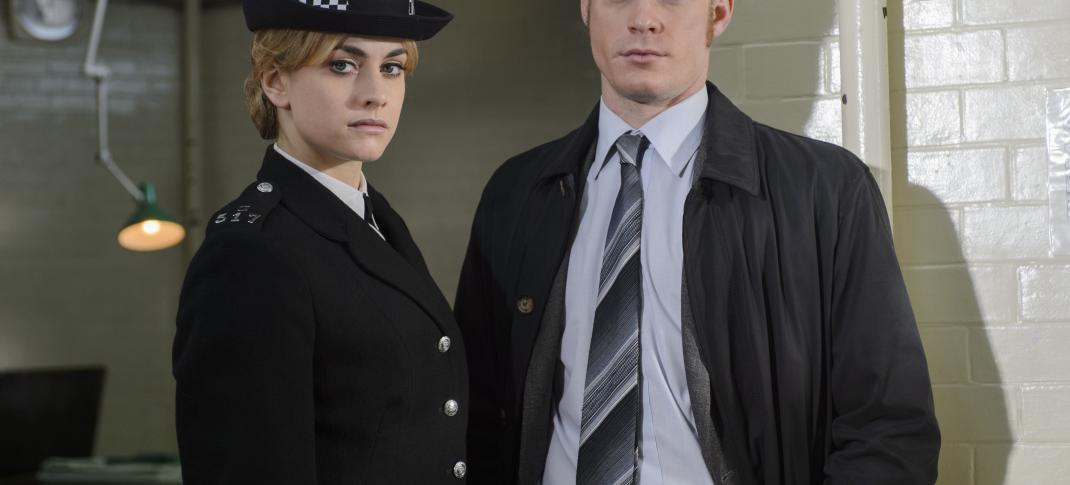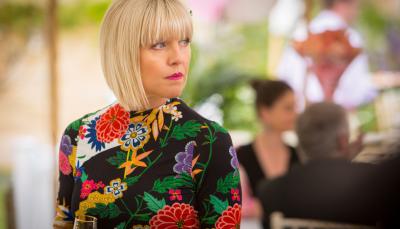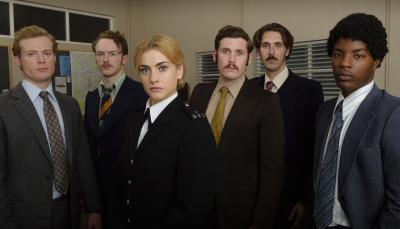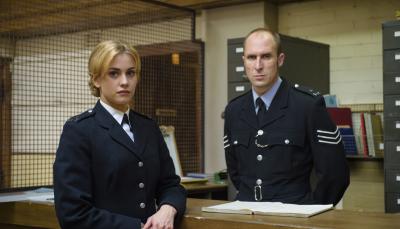'Prime Suspect: Tennison' Recap: Episode 1

Prime Suspect: Tennison MASTERPIECE on PBS Shown from left to right: Stefanie Martini as Jane Tennison and Sam Reid as DI Bradfield Part One Sunday, June 25, 2017 from 10 - 11:30pm ET Jane Tennison isn’t on the force for long before she starts to learn the cold facts of police work. She turns the head of her handsome boss, DI Bradfield, but also impresses him with her instincts. He enlists her help, and Jane becomes immersed in her first murder investigation. Courtesy of ITV Studios and NoHo Film & Televison for ITV and MASTERPIECE For editorial use only.
Prime Suspect: Tennison arrives on PBS with a hope of rebooting (or at least telling the origin story behind) the original 1990s program. But why does this show feel so irrelevant in 2017?
DI Bradfield: Nervous?
WPC Tennison: A bit. Nothing like getting thrown in the deep end.
When Prime Suspect debuted in 1991, it was a breath of fresh air after series after series starring men in period mystery stories. A modern day crime thriller series that starred Helen Mirren in the lead role, it was one of the 1990s most memorable programs from ITV.
Prime Suspect: Tennison aims to revive the series by taking us back to the beginning, before Tennison was one of the first DCIs in London's police force. Instead, the year is 1973 (in the UK, the progam was in fact titled Prime Suspect: 1973) and our heroine is mere WPC Tennison (played by newcomer Stefanie Martini), aged 22 or so, living at home with her parents, and experiencing her first murder case. The idea is sound. ITV recently had success rebooting the Inspector Morse series in this manner with Endeavour, as the original spin off Inspector Lewis wound down.
But Prime Suspect: Tennison doesn't have the same snap as Endeavour. This is partly due to the period piecing of it. In Endeavour, taking things back to the 1960s works, because Morse's success was never based on being a modern era program. Prime Suspect, on the other hand, was deeply tied to the 1990s era. Not only in the case of the Tennison character herself, who was dealing with sexism that was so ingrained it might as well have been of the air, but the mysteries were as well. Like all the best parables, Prime Suspect's original stories were a reflection of the society that spawned it, in this case the late Thatcher era. (There's a reason that the first five seires ended in 1996, just before Labour swept into power.) When the show was brought back in 2003, it was because once again, UK society was dealing with a party that has come to power, but then lost their bearings, covering the final years of Labour rule during the Iraq war.

Prime Suspect, as a period piece, could have found ways to talk about post-Brexit society, drawing on the earlier era to portray a more openly racist and nationalist society of the time. Instead for reasons best known to itself, it doesn't bother, perferring to focus on soundtrack, outfits and cars. It's a bit like whoever wrote it never understood that the parables were why the mysteries worked, and instead only ever got the "interlaced puzzle pieces that seem completely unrelated at first" style of storytelling it used.
Plus you know, sexism. Let's make Tennison wash cups, get asked to clean up vomit, and serve tea. Somehow one gets the sense that a young Mirren in that position would be able to deliver a steely silent rage as she did so. Martini merely looks vaguely miffed.
As for the mystery, it certainly does have some of the hallmarks of the way Prime Suspect stories were introduced. One morning, a drug addicted prostitute named Julie-Anne Collins turns up dead in the underpass of a run down housing estate, at the same time that Tennison is delayed in getting to work because she witnesses an old lady getting mugged. At first, these things don't seem related, even as we learn the mugging victim turns out to live in the same estate. But the mugged woman's sons, one who slams a door in Tennison's face, and the other who turns out to be one of Julie-Anne's boyfriends, are setting up a bank heist that's being choreographed from behind bars via their father Clifford Bentley (Alun Armstrong). He in turn is doing it for career criminal Clay Whiteley. By the end of the first thirty minutes, we've already learned the mugging was orchestrated by Whiteley in order to keep these outside minions in line. By the end of the episode, we learn Tennison's boss has a personal grudge against Bentley as well. How long until we figure out how this heist is related to Julie's murder too?
Tennison: The bra's strapless, so it might not have been removed forcibly. Maybe she took it off, beneath her top?
Bradfield: Fair point.
Meanwhile, her parent's claims of not having seen her recently are easily tossed aside, as one of her other, junkier, boyfriends turns up at their house aftre escaping custody. Complicating matters, Julie, upon examination, turns out to have been pregnant. But by which boyfriend is unclear--the one working the bank heist, or the missing junkie? They also turn out to be the owners of the red jaguar that was seen taking her away from rehab. By episode's end, we've proof that they took her home and locked her up in a spare room during the two weeks between the last time she was seen and her death. A failed attempt at getting her sober? Or something more sinister?
The mystery would be a fine way to spnd 90 minutes in a passible whodunit sort of way. But this is Prime Suspect, and comes with larger expectations than that. Making the frustrations worse, as the episode goes along, it becomes more and more obvious that Tennison is being given a fair amount to do on the case, not because she earned it, but because the DI is attracted to her. One assumes that won't stay under wraps for long--in fact her fellow female officer is already warning her it's getting out. Perhaps someone can tell her mother too, so we can hear more cliches of dropping one's career after earning one's MRS.
Next week, Tennison will make a couple of major discoveries to move the case along. Perhaps this is really is how Tennison got to where she was nearly twenty years later. But as a tale of a feminist rising, this installment was a more than a bit disheartening.




